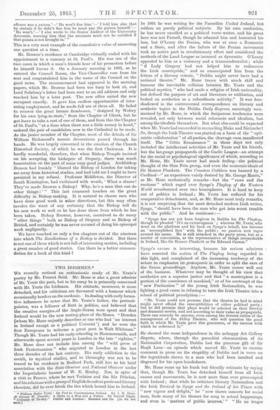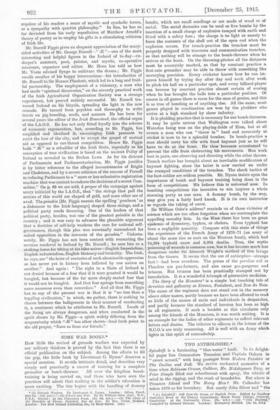TWO IRISHMEN.*
Wu recently noticed an enthusiastic study of Mr. Yeats's poetry by Mr. Forrest Reid. Mr. Hone is also a great admirer of Mr. Yeats the poet, but in his essay he is primarily concerned with Mr. Yeats the Irishman. His attitude, moreover, is more detached, and his criticisms are flavoured with a humour which occasionally borders on the sardonic. In dealing with early forma- tive influences he notes that Mr. Yeats's father, the portrait- painter, was a follower of Butt in politics, and believed that the creative energies.of the Anglo-Saxon were spent and that Ireland would be the new resting-place of the Muses. " Dowden [whom Mr. Hone unjustly describes as one who had no interest in Ireland except as a political Unionist'] and ho were the first Europeans to welcome a great poet in Walt Whitman." Though Mr. Yeats had his early schooling in Hammersmith, and afterwards spent several years in London in the late " eighties," Mr. Hone does not include him among the " wild geese of Irish Protestantism " who migrated to London in the last three decades of the last century. His early addiction to the occult, to mystical studies, and to theosophy was not to be traced to his residence in Bedford Park, still less to his brief association with the Scots Observer and National Observer under the Imperialistic banner of W. E. Henley. Nor, in spite of a visit to France, whore he met Verlaine and the Sas Peladan, and his relations with a group of English decadent poets and literary theorist!, did he over break the ties which bound him to Ireland.
• William Butler Yeats : the Poet in Contemporary Ireland. By J. M. Hone, eV (Gcorge W, Itueeell): a Study of a Man and a Nation. By Darrell Figgie.
• Irishmen of lo-doy." Lublin and London : Mnunsel nail Co. ids. Od, ins mocha ' •
In 1891 he was writing for the Parnellite United Ireland, but seldom on purely political subjects. By his own confession, he has never excelled as a political verse-writer, and his great hero was not Parnell, though he admired him and lamented his loss, but O'Leary the Fenian, who was at once a Romantic and a Stoic, and after the failure of the Fenian movement took no active part in revolutionary effort and considered the methods of the Land League as immoral as dynamite. O'Leary appealed to him as a visionary and a transcendentalist ; while " if Lady Gregory had not helped him to rediscover the Irish countryside," and so emancipated him from the fetters of a literary coterie, " Dublin might never have had a national theatre." Mr. Hone traces with much skill and humour the inevitable collision between Mr. Yeats and the political mystics, " who had made a religion of Irish nationality, but defined the purpose of art and literature as utilitarian, and looked on aesthetics as a subordinate activity." It was fore- shadowed in the controversial correspondence on literary and aesthetic topics in the Dublin Daily Express, amusingly sum- marized by Mr. Hone, in which the fissiparous tendencies were revealed, not only between social reformers and idealists, but among the idealists themselves. But what else could be expected when Mr. Yeats had succeeded in reconciling Blake and Nietzsche! So, though the Irish Theatre was started on a basis of the " opti- mistic collaboration" of all parties, the cleavage soon manifested itself. The " Celtic Renaissance " in those days not only included the intellectual activities of Mr. Yeats and his friends, but the Ian guage propaganda of the Gaelic League—an attempt for the social or psyehological significance of which, according to Mr. Hone, Mr. Yeats never had much feeling—the political thought of the Sinn Fein group, and even the economic ideals of Sir Horace Plunkett. The Countess Cathleen was banned by a Cardinal—" an experience vainly desired by Mr. George Moore," as Mr. Hone sardonically remarks—but the " rows and the ructions " which raged over Synge's Playboy of the Western World reverberated over two hemispheres. It is hard to keep out of politics in Ireland ; Mr. Yeats has suffered for his comparative detachment, and, as Mr. Hone most truly remarks, it is not surprising that the most detached modern Irish writer, Synge, "should have been the man who got into worst trouble with the public." And he continues Synge has not yet been forgiven in Dublin for The Playboy, though he pleaded ' It's an extravaganza' ; whereas Mr. Yeats, who went on the platform and hit back on Synge's behalf, has become an accomplished fact' with the public ; no passion now rages around his name. lie is still attacked in the party press, but as a matter of convention, as the representative of things irremediable in Ireland, like Sir Horace Plunkett or Sir Edward Carson."
Synge's excuse is interesting, because his serious admirers have resented the notion of The Playboy being regarded in this light, and complained of the increasing tendency of the actors to emphasize its grotesquerie in order to split the ears of the Saxon groundlings. Anyhow, Mr. Yeats comes well out of the business. Whatever may be thought of his view that aesthetics are a superior justice and that " a masterpiece is a portion of the conscience of mankind," or of his contempt of the " new Puritanism " of the young Irish Nationalists, he was fighting a good cause in refusing to turn the Irish Theatre into a school of political proselytism
"Mr. Yeats could not promise that the theatre he had in mind might never offend the susceptibilities of either political party ; but ho did promise that plays would be selected on their literary and dramatic merits, and not according to their value as propaganda. There can scarcely be anyone, even• among the fiercest critics of the management of the Abbey Theatre, who will question the good faith in which Mr. Yeats gave this guarantee, or the success with which he redeemed it."
He showed the same independence in the unhappy Art Gallery dispute, where, through the parochial obscurantism of its Nationalist Corporation, Dublin lost the generous gift of Sir Hugh Lane—an episode which moved Mr. Yeats to caustic comment in prose on the stupidity of Dublin and in verse on the ingratitude shown to a man who had been insulted and disgraced for his open-handedness.
Mr. Hone sums up his frank but friendly estimate by saying that, though Mr. Yeats has detached himself from all Irish causes and movements, he is now more than ever preoccupied with Ireland ; that while he criticizes literary Nationalism and the Irish Revival in Synge and the Ireland of his Times with " new vigour and delight," he " now shows concern for social man, finds many of his themes for song in actual happenings, and 'even in matters of public iateregt.' " " He no longer
requires of his readers a sense of mystic and symbolic terms, or a sympathy with quietist philosophy." In fine, he has so far deviated from his early repudiation of Matthew Arnold's theory of poetry as to employ his gifts in a stimulating criticism of Irish life.
Mr. Darrell Figgie gives an eloquent appreciation of the many- sided activities of Mr. George Russell—" ./E "—one of the most interesting and helpful figures in the Ireland of to-day--cx- draper's assistant, poet, painter, and mystic, co-operative missioner, organizer and editor. Mr. Hone has told us how Mr. Yeats advised Synge to cultivate the drama ; Mr. Figgis recalls another of his happy interventions—his introduction of Mr. Russell to Sir Horace Plunkett, which led to a long and fruit- ful partnership. The employment of a visionary, a man who had made "spiritual discoveries," on the severely practical work of the Irish Agricultural Organization Society was a strange experiment, but proved entirely successful. Mr. Russell tra- versed Ireland on his bicycle, spreading the light in the new crusade. He turned from psychics and theosophy to write tracts on pig-breeding, seeds, and manure He has been for several years the editor of the Irish Homestead, the official organ of the I.A.O.S. He has not only fitted loyally into the scheme of economic regeneration, but, according to Mr. Figgis, has amplified and idealized it, encouraging Irish peasants to resist the lure of the city, and to accept the gospel of mutual aid as opposed to cut-throat competition. Hence Mr. Figgis hails "1E " as a rebuilder of the Irish State, especially as his conception of true civilization is based on the ancient Polity of Ireland as revealed in the Brehon Laws. As for his distrust of Parliaments and Parliamentarianism, Mr. Figgie justifies it by bitter reference to the alleged inconsistencies of Bright and Gladstone, and by a severe criticism of the success of Parnell in reducing Parliament to a " more or less submissive registration machine that was content to endorse the decisions of a secret Com- mittee." On p. 68 we are told, a propos of the campaign against usury initiated by the I.A.O.S., that " the strings that pull the actions of this world are shaped of gold, and none other are of avail. The gaimbin [Mr. Figgis resents the spelling gombeen ' as a dishonour to the Irish language] shaped these strings, and a political party needs financing. One of the leaders of that political party, besides, was one of the greatest gaimbin in the country ; and it was easy to advance the plausible argument that a doctrine of self-help weakens the ease for national self- governance, though this plea was eventually surrendered for naked opposition in the interests of the gaimbin." Unfortu- nately, Mr. Figgis has not been content with recounting the services rendered to Ireland by Mr. Russell ; he uses him as a stalking-horse for tilting at his biles noires—English Imperialism, English industrialism, English blatancy and brutality. The Irish, he says, are " the heirs of centuries of such abominable oppression as has never yet in history been inflicted by one nation on another." And again : " The right to a State of Ireland is not denied because of a fear that if it wore granted it would be bungled, but because of the far more deeply seated fear that it would not bo bungled. And that fear springs from something more nauseous even than cowardice." And all that Mr. Figgis has to say of the present war is that it is "no less than a toppling civilization," in which, we gather, there is nothing to choose between the belligerents in their manner of conducting it, a sentiment which he attributes to Mr. Russell. Lauds of the living are always dangerous, and when conducted in tho spirit shown by Mr. Figgis—a spirit widely differing from the magnanimity which ".IE" has ofterr shown—lend fresh point to the old prayer, "Save us from our friends."



































 Previous page
Previous page